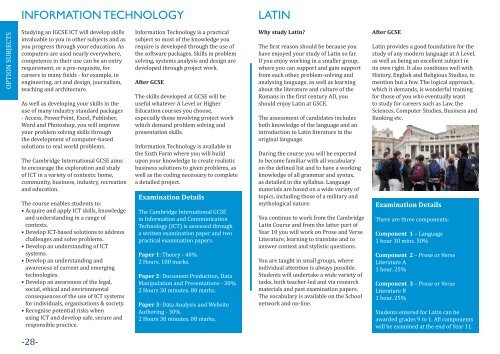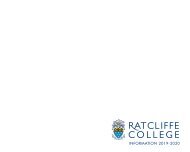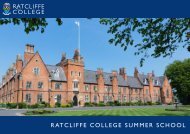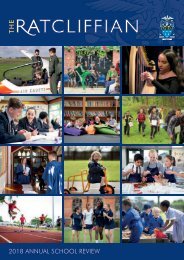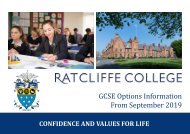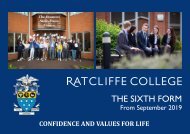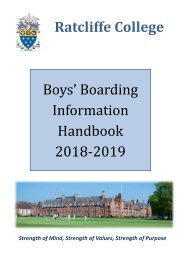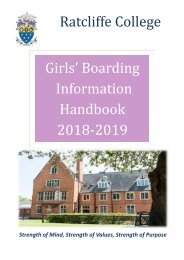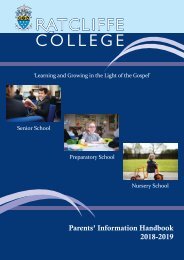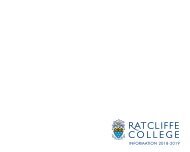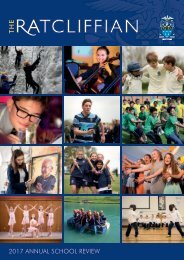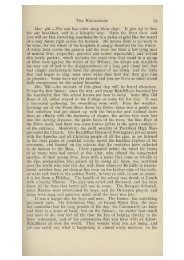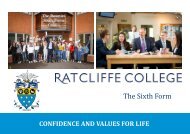Ratcliffe College - GCSE Handbook
You also want an ePaper? Increase the reach of your titles
YUMPU automatically turns print PDFs into web optimized ePapers that Google loves.
INFORMATION TECHNOLOGY<br />
LATIN<br />
OPTION SUBJECTS<br />
Studying an I<strong>GCSE</strong> ICT will develop skills<br />
invaluable to you in other subjects and as<br />
you progress through your education. As<br />
computers are used nearly everywhere,<br />
competence in their use can be an entry<br />
requirement, or a pre-requisite, for<br />
careers in many fields - for example, in<br />
engineering, art and design, journalism,<br />
teaching and architecture.<br />
As well as developing your skills in the<br />
use of many industry standard packages<br />
- Access, PowerPoint, Excel, Publisher,<br />
Word and Photoshop, you will improve<br />
your problem solving skills through<br />
the development of computer-based<br />
solutions to real world problems.<br />
The Cambridge International <strong>GCSE</strong> aims<br />
to encourage the exploration and study<br />
of ICT in a variety of contexts: home,<br />
community, business, industry, recreation<br />
and education.<br />
The course enables students to:<br />
• Acquire and apply ICT skills, knowledge<br />
and understanding in a range of<br />
contexts.<br />
• Develop ICT-based solutions to address<br />
challenges and solve problems.<br />
• Develop an understanding of ICT<br />
systems.<br />
• Develop an understanding and<br />
awareness of current and emerging<br />
technologies.<br />
• Develop an awareness of the legal,<br />
social, ethical and environmental<br />
consequences of the use of ICT systems<br />
for individuals, organisations & society.<br />
• Recognise potential risks when<br />
using ICT and develop safe, secure and<br />
responsible practice.<br />
Information Technology is a practical<br />
subject so most of the knowledge you<br />
require is developed through the use of<br />
the software packages. Skills in problem<br />
solving, systems analysis and design are<br />
developed through project work.<br />
After <strong>GCSE</strong><br />
The skills developed at <strong>GCSE</strong> will be<br />
useful whatever A Level or Higher<br />
Education courses you choose,<br />
especially those involving project work<br />
which demand problem solving and<br />
presentation skills.<br />
Information Technology is available in<br />
the Sixth Form where you will build<br />
upon your knowledge to create realistic<br />
business solutions to given problems, as<br />
well as the coding necessary to complete<br />
a detailed project.<br />
Examination Details<br />
The Cambridge International <strong>GCSE</strong><br />
in Information and Communication<br />
Technology (ICT) is assessed through<br />
a written examination paper and two<br />
practical examination papers.<br />
Paper 1: Theory - 40%<br />
2 Hours. 100 marks.<br />
Paper 2: Document Production, Data<br />
Manipulation and Presentations - 30%<br />
2 Hours 30 minutes. 80 marks.<br />
Paper 3: Data Analysis and Website<br />
Authoring - 30%<br />
2 Hours 30 minutes. 80 marks.<br />
Why study Latin?<br />
The first reason should be because you<br />
have enjoyed your study of Latin so far.<br />
If you enjoy working in a smaller group,<br />
where you can support and gain support<br />
from each other, problem-solving and<br />
analysing language, as well as learning<br />
about the literature and culture of the<br />
Romans in the first century AD, you<br />
should enjoy Latin at GSCE.<br />
The assessment of candidates includes<br />
both knowledge of the language and an<br />
introduction to Latin literature in the<br />
original language.<br />
During the course you will be expected<br />
to become familiar with all vocabulary<br />
on the defined list and to have a working<br />
knowledge of all grammar and syntax,<br />
as detailed in the syllabus. Language<br />
materials are based on a wide variety of<br />
topics, including those of a military and<br />
mythological nature.<br />
You continue to work from the Cambridge<br />
Latin Course and from the latter part of<br />
Year 10 you will work on Prose and Verse<br />
Literature, learning to translate and to<br />
answer context and stylistic questions.<br />
You are taught in small groups, where<br />
individual attention is always possible.<br />
Students will undertake a wide variety of<br />
tasks, both teacher-led and via research<br />
materials and past examination papers.<br />
The vocabulary is available on the School<br />
network and on-line.<br />
After <strong>GCSE</strong><br />
Latin provides a good foundation for the<br />
study of any modern language at A Level,<br />
as well as being an excellent subject in<br />
its own right. It also combines well with<br />
History, English and Religious Studies, to<br />
mention but a few. The logical approach,<br />
which it demands, is wonderful training<br />
for those of you who eventually want<br />
to study for careers such as Law, the<br />
Sciences, Computer Studies, Business and<br />
Banking etc.<br />
Examination Details<br />
There are three components:<br />
Component 1 – Language<br />
1 hour 30 mins. 50%<br />
Component 2 – Prose or Verse<br />
Literature A<br />
1 hour. 25%<br />
Component 3 – Prose or Verse<br />
Literature B<br />
1 hour. 25%<br />
Students entered for Latin can be<br />
awarded grades 9 to 1. All components<br />
will be examined at the end of Year 11.<br />
-28-


